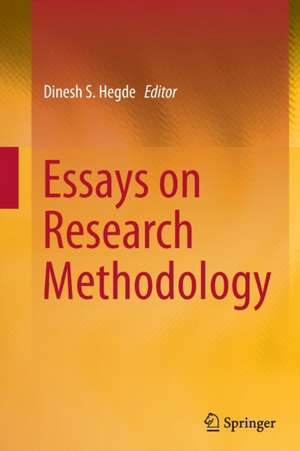Essays on Research Methodology
Editat de Dinesh S. Hegdeen Limba Engleză Paperback – 23 oct 2016
The distinguishing feature of this book is that it recognizes the diverse backgrounds of scholars from different interdisciplinary areas as well as their varying needs with regard to modeling, observations, measurements, aggregation, data analyses, etc. After all, researchers are expected to deepen our understanding, expand on existing information, introduce fresh insights, present new evidence and/or disprove accepted theories, hypotheses etc. More importantly, the book cautions against the over-reliance on software packages and mechanical interpretation of results based on the size, sign and significance of the coefficients obtained. Instead, the focus is on the underlying theories, hypotheses and relationships and on establishing new ones. In doing so, due care is taken to clearly enunciate what exactly constitutes a knowledge claim and what is methodology as distinct from methods, tools and techniques.
| Toate formatele și edițiile | Preț | Express |
|---|---|---|
| Paperback (1) | 638.24 lei 6-8 săpt. | |
| Springer India – 23 oct 2016 | 638.24 lei 6-8 săpt. | |
| Hardback (1) | 644.49 lei 6-8 săpt. | |
| Springer India – 24 iun 2015 | 644.49 lei 6-8 săpt. |
Preț: 638.24 lei
Preț vechi: 750.88 lei
-15% Nou
Puncte Express: 957
Preț estimativ în valută:
122.12€ • 127.51$ • 101.08£
122.12€ • 127.51$ • 101.08£
Carte tipărită la comandă
Livrare economică 05-19 aprilie
Preluare comenzi: 021 569.72.76
Specificații
ISBN-13: 9788132229544
ISBN-10: 8132229541
Ilustrații: XV, 234 p. 43 illus.
Dimensiuni: 155 x 235 mm
Greutate: 0.36 kg
Ediția:Softcover reprint of the original 1st ed. 2015
Editura: Springer India
Colecția Springer
Locul publicării:New Delhi, India
ISBN-10: 8132229541
Ilustrații: XV, 234 p. 43 illus.
Dimensiuni: 155 x 235 mm
Greutate: 0.36 kg
Ediția:Softcover reprint of the original 1st ed. 2015
Editura: Springer India
Colecția Springer
Locul publicării:New Delhi, India
Cuprins
Chapter 1. Introduction.- Chapter 2. Knowledge Claims - Approaches & Perspectives.- Chapter 3. Logical and Epistemological Norms in Scientific Theory Construction.- Chapter 4. Problem Formulation.- Chapter 5. Systems Approach and Soft Systems Methodology of Organization and Management Studies.- Chapter 6. Qualitative Research and its Application in Organisational Management and Social Research.- Chapter 7. On the Role and Significance of Contextualization in Economic Research.- Chapter 8. On using experimental designs.- Chapter 9. Questionnaire Design for Survey Based Research.- Chapter 10. Ethics In Research With Special Reference To Social Sciences.
Notă biografică
Dinesh S. Hegde is a former Professor of Economics, National Institute of Industrial Engineering (NITIE), Mumbai where he had been teaching courses such as industrial environment & policy, global economic perspectives, business analysis & econometric applications and research methodology for well over two decades. He had earlier taught at Bayero University Kano, Nigeria and University of Dar es Salaam, Tanzania. While with the latter, he also served as a Consultant/Coordinator for a major research project on inter-industrial flow matrix jointly sponsored by the University Department of Economics, Ministry of Planning & Development, Govt. of Tanzania and SIDA. Over the years, Dr. Hegde has supervised many Masters & Doctoral dissertations and numerous summer/winter projects in addition to undertaking several consulting assignments and executive training programmes for corporate across oil, gas, power, electronics, chemicals, automobiles, airports and ports on diverse techno-economic/managerial issues of concern. His areas of expertise include techno-economic studies, technology evaluation, labour and infrastructure on which he has published numerous articles in reputed journals and also contributed papers in edited volumes. Presently, he is Visiting Faculty at Indian Institute of Management Raipur.
Other contributors:
Dr. Rita Aggarwal, Professor and Director, Faculty of Management & Technology, Harish Chandra Post-graduate College, Varanasi, India
Dr. R. Bandyopadhyay: Former Director, National Institute of Bank Management, Pune, India; Visiting Research Professor, University of Manchester, UK; currently Hon. Director, CASAD, Pune, India
Dr. L.M. Bhole, Former Professor of Economics, Indian Institute of Technology Bombay, Mumbai, India
Dr. Amitabha Gupta, Former Professor of Logic and Philosophy, Indian Institute of Technology Bombay, Mumbai, India
Dr. V.K. Kool,Professor, SUNY Polytechnic Institute, NY, USA
Dr. O.B. Sayeed, Former Professor of Organization Behaviour and Dean (Research), National Institute of Industrial Engineering, Mumbai, India; currently Adjunct Professor (OB/HR), IBS Hyderabad, India
Other contributors:
Dr. Rita Aggarwal, Professor and Director, Faculty of Management & Technology, Harish Chandra Post-graduate College, Varanasi, India
Dr. R. Bandyopadhyay: Former Director, National Institute of Bank Management, Pune, India; Visiting Research Professor, University of Manchester, UK; currently Hon. Director, CASAD, Pune, India
Dr. L.M. Bhole, Former Professor of Economics, Indian Institute of Technology Bombay, Mumbai, India
Dr. Amitabha Gupta, Former Professor of Logic and Philosophy, Indian Institute of Technology Bombay, Mumbai, India
Dr. V.K. Kool,Professor, SUNY Polytechnic Institute, NY, USA
Dr. O.B. Sayeed, Former Professor of Organization Behaviour and Dean (Research), National Institute of Industrial Engineering, Mumbai, India; currently Adjunct Professor (OB/HR), IBS Hyderabad, India
Textul de pe ultima copertă
The book presents a collection of essays addressing a perceived need for persistent and logical thinking, critical reasoning, rigor and relevance on the part of researchers pursuing their doctorates. Accordingly, eminent experts have come together to consider these significant aspects of the research process, which result in different knowledge claims in different fields or subject areas. An attempt has been made to find a common denominator across diverse management disciplines, so that the broadest range of researchers can benefit from the book. The topics have been carefully chosen to cover problem formulation, contextualizing, soft & hard modeling, qualitative and quantitative analysis and ethical issues, in addition to the design of experiments and survey-based research.
The distinguishing feature of this book is that it recognizes the diverse backgrounds of scholars from different interdisciplinary areas as well as their varying needs with regard to modeling, observations, measurements, aggregation, data analyses, etc. After all, researchers are expected to deepen our understanding, expand on existing information, introduce fresh insights, present new evidence and/or disprove accepted theories, hypotheses etc. More importantly, the book cautions against the over-reliance on software packages and mechanical interpretation of results based on the size, sign and significance of the coefficients obtained. Instead, the focus is on the underlying theories, hypotheses and relationships, and on establishing new ones. In doing so, due care is taken to clearly enunciate what exactly constitutes a knowledge claim and what is methodology as distinct from methods, tools and techniques.
The distinguishing feature of this book is that it recognizes the diverse backgrounds of scholars from different interdisciplinary areas as well as their varying needs with regard to modeling, observations, measurements, aggregation, data analyses, etc. After all, researchers are expected to deepen our understanding, expand on existing information, introduce fresh insights, present new evidence and/or disprove accepted theories, hypotheses etc. More importantly, the book cautions against the over-reliance on software packages and mechanical interpretation of results based on the size, sign and significance of the coefficients obtained. Instead, the focus is on the underlying theories, hypotheses and relationships, and on establishing new ones. In doing so, due care is taken to clearly enunciate what exactly constitutes a knowledge claim and what is methodology as distinct from methods, tools and techniques.
Caracteristici
Covers problem formulation, contextualizing, modeling, qualitative and quantitative analysis and ethical aspects, in addition to the design of experiments and survey-based research Recognizes the diverse backgrounds of scholars from different interdisciplinary areas, as well as their varying needs with regard to data analyses Especially helpful for researchers pursuing doctoral degrees



















